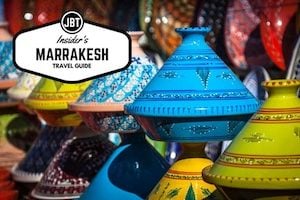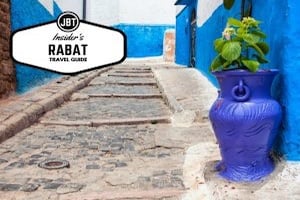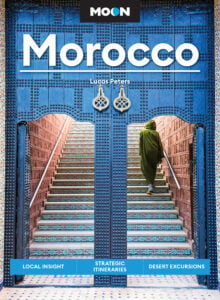Morocco is well known for many things: Incredible scenery, old mountains, deserts, and ancient but modern cities all top the list. But did you know that Morocco hosts one of the most demanding foot races in the world? The Marathon des Sables (Marathon of the Sands) is held every spring in the southern Moroccan desert, part of the region where many tourists take a Sahara Desert tour in Morocco. Runners and walkers gather together in Ouarzazate to be taken to the start of what could be called an extreme foot race or ultra-marathon.
You might call this Marathon the granddaddy of all foot races. It is equivalent of running 5½ marathons over 6 to 7 days. It covers 151 miles/243 kms. Each day’s stage of the race is different in length with the longest being 52 miles/84 km or almost 2 full marathons. Besides the length, the race is a test of stamina and mental strength. Racers are taken to the starting area for the race. All the runners must carry everything with them that they will need over the duration of the race. That means all the food, clothing, medical supplies, sleeping bag and etc. must be carried by the runner. Water is provided at checkpoints as well as the beginning and end of each day. Runners must provide their own meals. That means the food for 7 days must be carried in the rucksack. There are no take-outs or cafes along the way.
One must be in good physical condition to run this race. Being able to run many miles/km everyday takes a strong well trained body. Couple that with sleeping on the ground every night. Add in conditions that are not friendly to running such as rocky terrain and sand. Physical fitness is very important. Runners will be out in sun without shade for most of the day’s racing. Temps can rise to 120F/49C degrees. Sand gets into everything. Trying to keep sand out of ones shoes can be a challenge. When the temps get up so high, the sand and rocky terrain will radiate the heat back. Heat, distance and sand can spell trouble for those not prepared. So runners must be ready for this aspect of the race.
Just as important is the mental fitness of the racer. The same race conditions that tax the physical are a factor in the mental prep for this race. Another factor is the staggered lengths that are run each day. One day the racers will face 38km, followed by a day when the race will go for 82km. On the next day, it’s 42km. Runners must be able to face such conditions. Marathon des Sables is one tough race. You have to have self discipline and lots of motivation to run this race. Determination, alone may be the one factor that gets you to the finish line each day. At the end of the seventh day, you will be glad you hung in there.
Registration requirements are listed as well as the representatives for each area. Despites its grueling conditions, runners sign up early. At this writing in November 2008, most of the different countries quotas to run the 2009 race are already filled. In fact, the sign up for the 2010 race are being taken. The website has lots of good information and training tips to prepare oneself for the run in the sand.
Runner’s families are not allowed to follow the race course. There isn’t an infrastructure to support large groups of people. Harsh conditions and lack of resources en route make it impossible for the runners to have a support team. The families or friends wanting to be in Morocco for the adventure should contact a Morocco tour operator.
The Marathon des Sables is a good reason to have a Moroccan adventure. After the race is finished, make sure you take part in the many other places and things that Morocco has to offer. You can schedule an Atlas trek in Morocco’s Mountains or have a rest in a Berber village while taking in a few quiet days. If you wish to relax in luxury, Marrakech or Fez will give you many things to experience while taking advantage of the many modern hotels or riads. Morocco is a land full of history, beauty and adventure. Get in touch with a Moroccan tour group and let them set up everything for you and your runner to be ready for the well deserved rest following the world’s toughest race.
By Carole Morris, JBT Writer & Correspondent









Trackbacks/Pingbacks